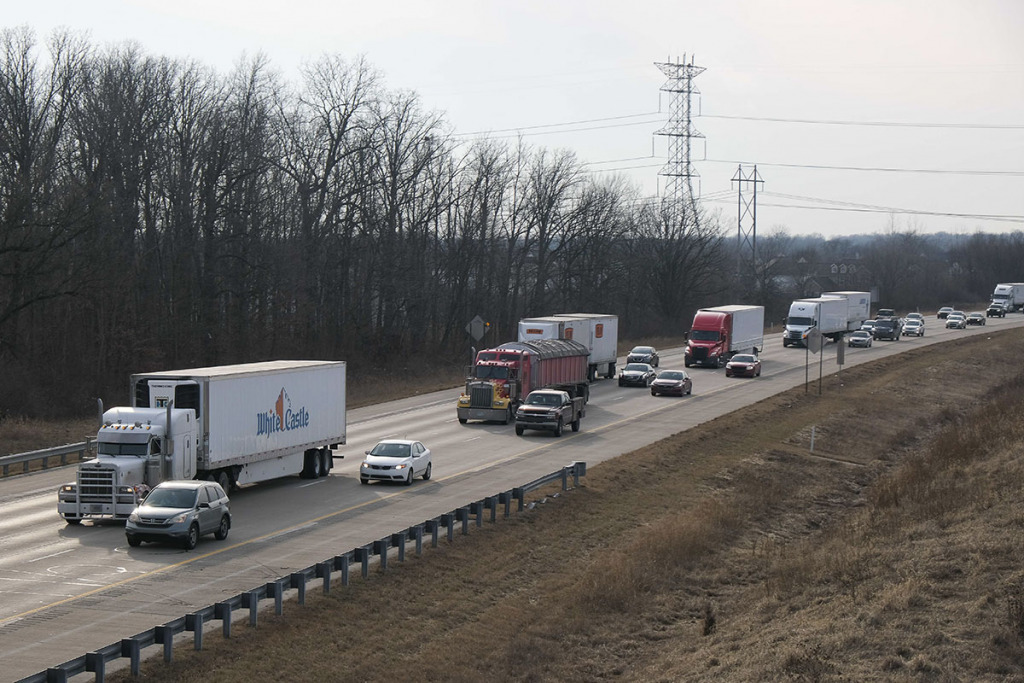Subscriber Benefit
As a subscriber you can listen to articles at work, in the car, or while you work out. Subscribe NowA bill that would raise the speed limit for trucks on certain Indiana roadways advanced to the full Senate on Tuesday despite opposition from the state’s largest truck drivers group.
Republican Sen. Jim Tomes, of Wadesville, authored the proposal that seeks to increase speed limits for large vehicles, like semi trucks, to 70 mph on highways and interstates outside urban areas.
Currently, those vehicles must not go above 65 mph.
Those in support of the increased speed limit for large trucks maintain that the current split speed creates congestion for surrounding traffic. They further argue that averting trucks can be hazardous—especially on rural roads that are often reduced to two lanes.
“If everybody’s flowing at the same speed, the traffic moves better, and you don’t have people stacking up on each other,” Tomes said. “I’m thinking that it makes sense that these trucks run even speed with cars and pickup trucks.”
Tomes also argued that transportation companies could still limit the top speeds on their trucks if they choose to do so. Many companies already do so.
Similar legislation has been filed in the Indiana Legislature in years prior without success.
Pushback from the Indiana Motor Truck Association is largely what kept those proposals from gaining traction. The group returned to the Statehouse Tuesday, urging lawmakers to instead focus on the “proximity of vehicles” traveling on Hoosier roadways “and not just the throughput of speed.”
“Simply put, faster trucks do not equal lesser trucks on the roadway,” said IMTA chairman Robert Haag. “We agree that the increased speed differentials are a problem. But the argument is not that trucks are going too slow and they need to go faster. The reality is cars are going too fast and should be slowed down.”
But GOP lawmakers on the Senate transportation committee maintained Tuesday that the speed limit change would make Hoosier roads safer by decreasing the interactions between large trucks and passenger vehicles. They approved Tomes’ bill 7-2.
Higher speeds, fewer accidents?
Under current Indiana law, passenger vehicles are allowed to travel at 70 mph while commercial vehicles (other than buses) weighing more than 26,000 pounds are subject to the reduced speed limit.
There are about 124,000 vehicles that meet this weight criteria registered in Indiana, according to a legislative fiscal report. The Indiana Department of Transportation reported in 2018 that more than 414 million tons of truck freight travels through Indiana each year, making it the fifth busiest state for commercial freight traffic.
“Right now, I think if you drive the interstates, you’ll find that a lot of these trucks are already driving 70 mph,” Tomes said. “If you’ve tried to overtake one, you’ll find you’re usually having to get up about 80 miles.”
INDOT legislative director Andrea Zimmerman did not say explicitly whether the state agency supports the bill, but she pointed to a joint research study by INDOT and Purdue University that suggests an increased speed limit for trucks would reduce crash frequencies in Indiana by approximately 20%.
That would result in a $479.3 million annual net benefit to the state, Zimmerman said.
Indiana is one of eight states that requires a lower speed limit for semi trucks on rural interstates and highways, according to the Insurance Institute for Highway Safety.
IMTA remains opposed
But increasing the speed limit for trucks would “invite aggressive driving habits” on Indiana’s roadways “at a time where we have less law enforcement,” said Haag, who also serves as president of Indianapolis-based Perfect Transportation, LLC.
“Oftentimes, cars do not like to travel around trucks. And so the idea is that you want to get away from a truck—you want to pass the truck. You want to be in front of the truck and not necessarily behind the truck,” Haag said. “Cars are going to have to increase their speed to then overtake that truck and get past that truck. And so it is leading to a race to a higher speed, if you will.”
He noted, too, that as older and more experienced drivers retire, “less experience and more speed are not always a recipe for long term success.”
“The best productivity is derived from thoughtful trip planning and thorough coordination of pickup and delivery times,” Haag said. “Driving faster does not have any significant impact on transit times or service levels with an increase or decrease of 5 mph.”
In 2020, there were 153 people killed in crashes involving large trucks in Indiana, according to the U.S. Department of Transportation. At least 26 fatal semi-involved crashes in the state involved speeding.
An Indiana Public Policy Institute report also notes that occupants in large trucks were almost five times as likely to be injured in crashes when speeding, compared to the same vehicle type not speeding.
The Indiana Capital Chronicle is an independent, not-for-profit news organization that covers state government, policy and elections.
Please enable JavaScript to view this content.


“Currently, those vehicles must not go above 65 mph”, LOL!
Right?! It’s like people making these statements have never driven on 465.
“I’m thinking that it makes sense that these trucks run even speed with cars and pickup trucks.” Republican Sen. Jim Tomes, of Wadesville
No research was done? No data pulled? No partnering with other states who already implemented such a change to understand impacts? What an embarrassment.
Nothing more annoying than a truck going 65 passing one that is going 64……
“If everybody’s flowing at the same speed, the traffic moves better, and you don’t have people stacking up on each other,” Tomes said.” Clearly this was a paid advertisement.